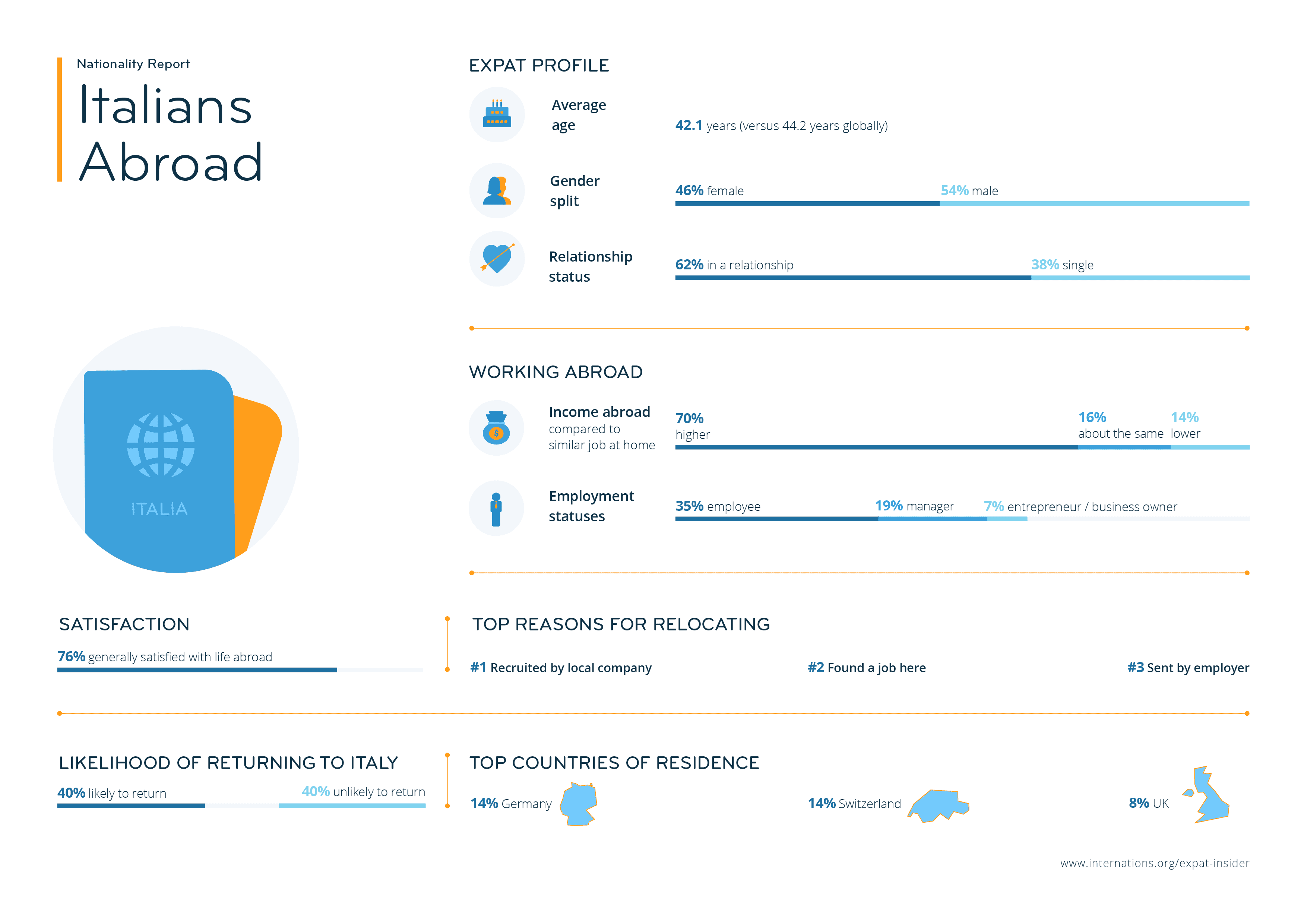Work-Motivated Italians No Strangers to Life Abroad
Slightly younger than average and often highly educated, more and more Italians are reaping the financial benefit of working abroad.
- Seven in ten Italians earn more money from employment abroad than at home.
- Just 8% moved abroad for love.
- 35% speak the local language of their host country excellently.
- 46% find making local friends difficult.
- 56% hold a postgraduate degree.

Expat Life Pays Off
Although over one in four Italians (27%) say that they do not yet feel at home in their host country, and a further 17% say that they never will, only a quarter think that it’s very likely they’ll return to their home country.
This might be attributed to the financial benefits of working abroad, away from the financial and economic difficulties which Italians have come to know in recent times. Before moving, 65% of Italians considered the economy and/ or labor market in their destination a potential benefit of moving abroad, while only 4% regarded it as a disadvantage. In addition, 37% also believed that taxation would be an advantage of expat life, compared to 24% globally.
For the majority of Italian expats, the expected financial benefits of expat life have come to fruition. A sizeable 70% of Italian respondents claim that they make more money from employment or business abroad than they would in a similar position at home, and more than a third (34%) say they earn a lot more. All this is while working 43.3 full-time hours a week, slightly fewer than the global average of 44.0.
Language Barrier No Problem for Italian Expats
For Italians, learning the language of their host country doesn’t seem to be a problem: 23% say they speak it fairly well, compared to 19% globally. More impressively, 35% have excellent local language skills, which is again higher than the global average of 27%.
On average, Italian expats are also more likely to name language learning as a motivation to go abroad. For 15% of Italian respondents, language was stated as one of their reasons for moving abroad. This is four percentage points more than the worldwide average of 11%.
Career-Driven and Well-Educated Expats
Italian expats clearly focus on their working life abroad. Nearly one in six (15%) moved abroad because they found a job there on their own, while another 15% were recruited by a local company, more than double the survey average of 7%.
A higher-than-average share of Italians abroad are very well educated, with more than half (56%) holding a postgraduate degree (e.g. a master’s), including 13% with a PhD. Moreover, 51% of Italian respondents have a gross household income between 50,000 USD and 150,000 USD a year, compared to just 40% worldwide.
Little Time for Love
For the majority of Italian expats, a demanding working life and a focus on their career means that there is little time for love to flourish. Just 65% of Italian men say that they are in a committed relationship, compared to 71% worldwide, and the share of Italian women in a committed relationship (58%) is also slightly below the global average of 61%.
If being single was any motivation to move abroad in order to find love, then it appears the Italians wouldn’t know it. Just 8% say that they moved abroad for love, compared to 12% worldwide. Moreover, 19% of Italian expats in a relationship are currently not even living in the same country as their partner, dealing with the additional stress of an international long-distance relationship.
Making Friends with Locals Not on the Agenda
Unlike many other expats, Italian respondents tend not to diversify their group of friends when living abroad. Almost half of Italian expats (46%) find making local friends difficult, and these problems are reflected in the dynamic of their social circle.
More than two in five Italian expats (45%) say that their friend group is comprised predominantly of other expats, compared to a global average of 35%, and just 11% describe their friends in their new country of residence as mostly local residents. Nearly a third (32%) say they are dissatisfied with their personal lives in terms of making new friends in general.
Further Reading
Advertisement
Join InterNations
The community for expats worldwide
Download

